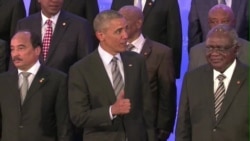President Barack Obama's effort to engage Africa brought together the largest summit of African leaders ever held in Washington. But China has hosted such summits before, and the U.S. gathering highlights what some see as a belated U.S. effort to catch up and expand its economic ties with Africa.
The might of large American corporations like Coca Cola is powering the Obama administration's latest efforts to build its partnership with Africa.
The company at the summit announced it's boosting its investment by $5 billion in safe water and other programs.
China, too, has invested heavily -- doing twice as much trade with Africa as the U.S. But Beijing has been accused of ignoring governance and human rights issues.
Corporate investment
Obama announced $14 billion of American corporate investment at the Africa summit, but indicated the United States will have a different approach.
“Capital is one thing. Development programs and projects are one thing. But, but rule of law? Regulatory reform? Good governance? Those things matter even more, because people should be able to start a business and ship their goods without having to pay a bribe or hire somebody's cousin.”
This was a big summit, but Beijing started hosting equally large numbers of African leaders 14 years ago.
U.S. officials say there is no competition with China for Africa.
Human rights, governance
Analyst Richard Downie agrees. "I think at heart, the U.S. and China have mutual interests in Africa. They're both interested in peace, stability and security because that's the best environment in which to grow markets and do business."
He said the U.S. seeks a new kind of engagement.
“The U.S. has traditionally focused very much on development issues, on tackling some of the big public health crises in Africa, such as HIV/AIDS and trying to resolve some of the most persistent conflicts," said Downie. "So it’s really focused on the downsides, the problems of Africa rather than the upside, the economic opportunities that China is focused on.”
This summit focused on the upside, with economic issues taking center stage. There were no sessions devoted to rule of law and justice. White House officials said leaders had a chance to talk about those issues on the sidelines.





